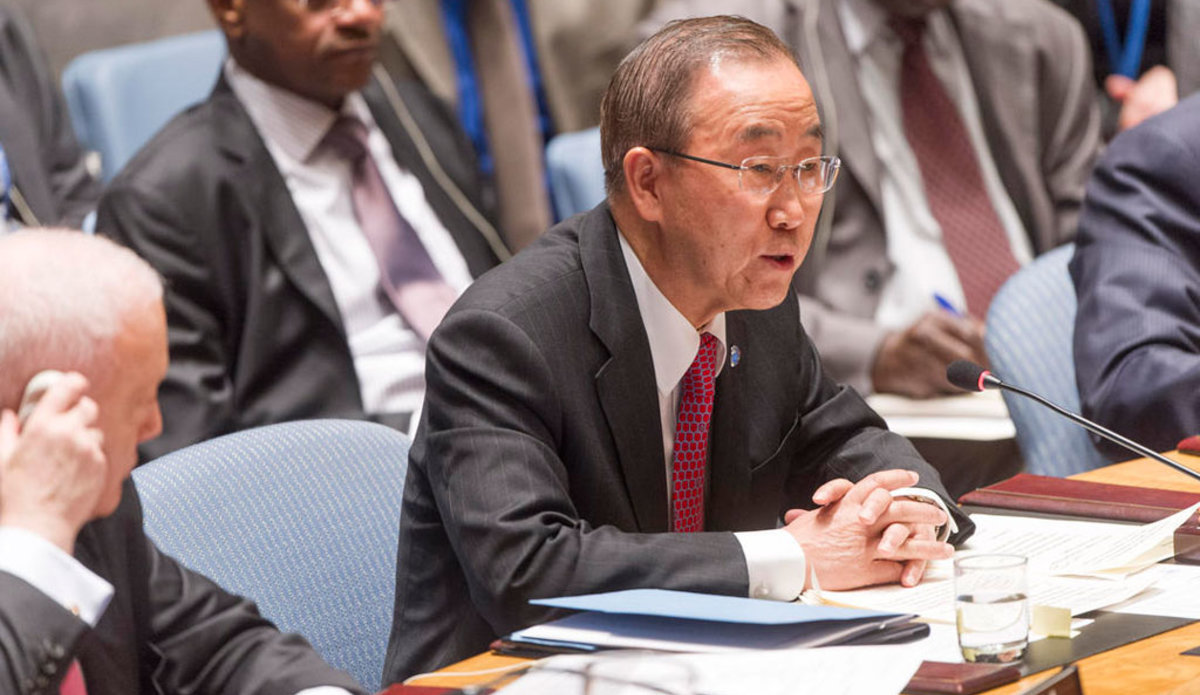“The Security Council and the AU [African Union] Peace and Security Council are working together more closely, and there is increased support for African-led peace operations and their transition into UN peacekeeping operations, as we have seen in Mali and the Central African Republic,” Mr. Ban told the 15-member Council.
“The UN Secretariat and the AU Commission meet regularly for the UN-AU Joint Task Force on Peace and Security, mapping out joint initiatives and strategies. Through the Regional Coordination Mechanism, both organizations have undertaken joint planning and implementation of programmes,” he explained.
In the Council’s open debate on “Peace Operations: The UN-AU Partnership and Its Evolution”, Mr. Ban was joined by Moussa Faki Mahamat, Foreign Minister of Chad and Nkosazana Dlamini-Zuma, Chairperson of the African Union.
“Our partnership must be based on a common understanding of what each organization can do in any given context, and on a realistic assessment of each other’s comparative advantages.”
In the Central African Republic, for example, cooperation between the African Union, the UN and the Economic Community of Central African States (ECCAS) led to the signing of the Cessation of Hostilities Agreement in Brazzaville in July, Mr. Ban said.
In Somalia, the AU and UN are working together with other partners to support the people and the Federal Government in its critical phase of state-building. The UN is also working closely with the African Union in Sudan and South Sudan.
In the Great Lakes region, strong cooperation has been vital to the progress that has been made under the Peace, Security and Cooperation Framework for the Democratic Republic of the Congo and the region, the Secretary-General explained.
In Burkina Faso, there was close cooperation between the UN, the AU and the Economic Community of West African States (ECOWAS) in the immediate aftermath of the uprising that led to the departure of former President Blaise Compaoré. But this crisis also points to the need for greater emphasis on preventive action.
“We also need to adapt in the face of an evolving peace and security landscape,” the UN chief said, pointing out that many peacekeeping missions are being mandated to advance national reconciliation and dialogue in the absence of peace agreements.
“Peacekeeping is also becoming a more crowded field, involving diverse actors and even parallel missions,” Mr. Ban said, underscoring his recently launched inquiry into peace operations as part of efforts to address some of these challenges. The review will encompass every aspect of the UN’s peace operations, from mandates to cooperation with the AU, to peacebuilding, the protection of civilians, accountability and the role of Special Political Missions and UN Police.
In addition to this review, the Secretary-General is also studying the handover modalities from AU to UN operations. He plans to submit an assessment with recommendations on the partnerships between the UN and regional organizations in March 2015.
The Secretary-General provided some recommendations today as well. First, building stronger political partnerships that are anchored in a clear strategic vision is crucial as is a clear, agreed role for the African Union and sub-regional organizations.
Further, he said that the UN, regional organizations and other partners must cooperate to enhance joint logistical capabilities. Member States with certain specialized capacities, from helicopters and intelligence to engineering expertise, can make invaluable contributions. Trilateral discussions with the European Union could be strengthened, as it also plays an important regional role in deploying and managing peace operations.
Lastly, he called for alternative methods of financing and advocated for further resources from within Africa while finding creative ways to mobilize the international community.
At the outset of the open debate this morning, the Security Council adopted a Presidential statement acknowledging progress made in the ongoing cooperation between the UN and the AU in peace operations but also urging Member States to contribute to strengthening the African Union’s capacity in conflict prevention and management.
By the text, the Council also stressed the importance of “supporting the political role of the AU,” both during the transition from AU to UN peacekeeping missions and the implementation of governance. Equally important is strengthening AU and UN capacities for early warning, conflict analysis, dialogue and mediation.
The Council also stressed the importance of a coordinated international response to causes of conflict and recognizes the need for development of effective long-term strategies. Like the Secretary-General, the Security Council also stressed the need to secure more financial resources from within the African continent.

